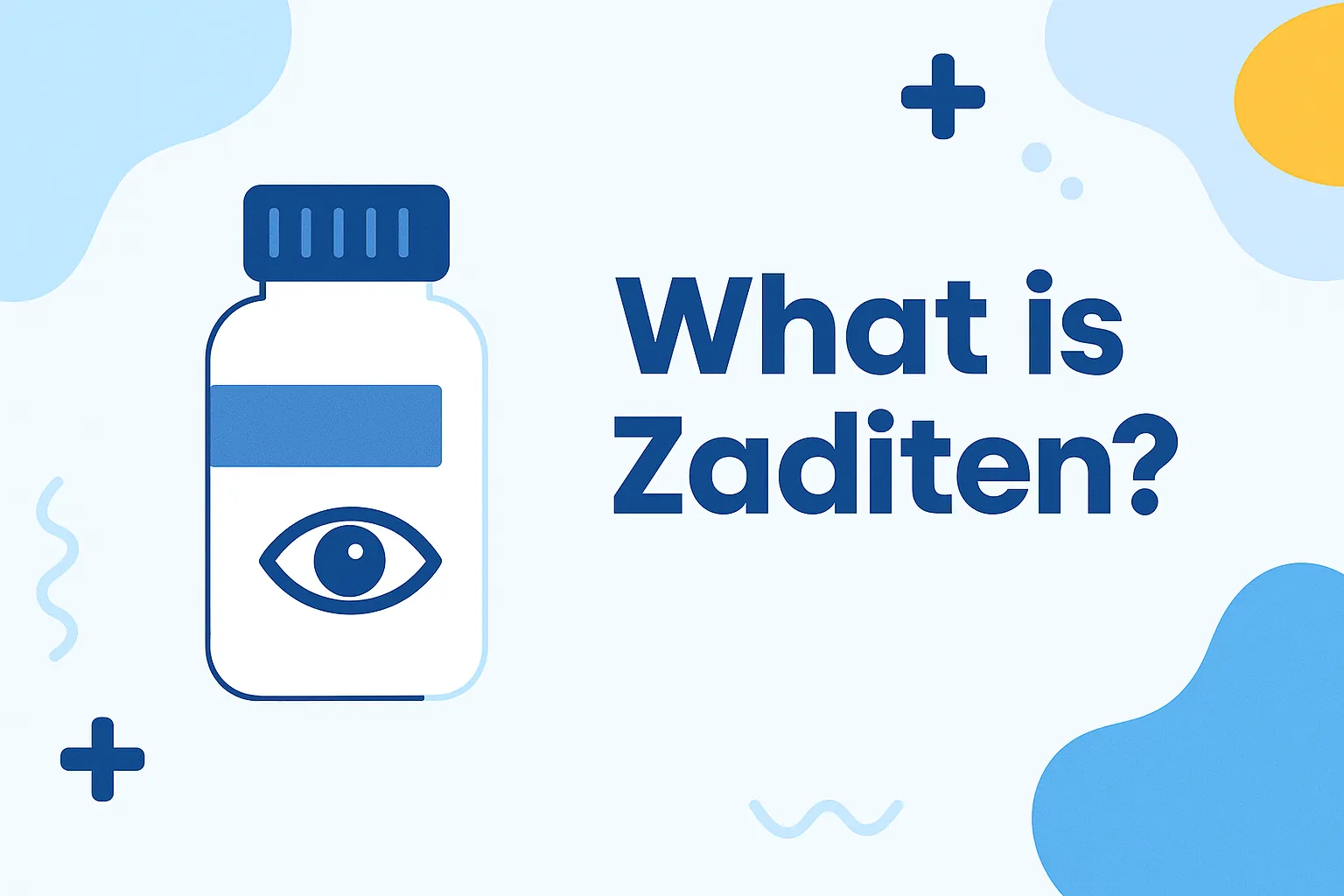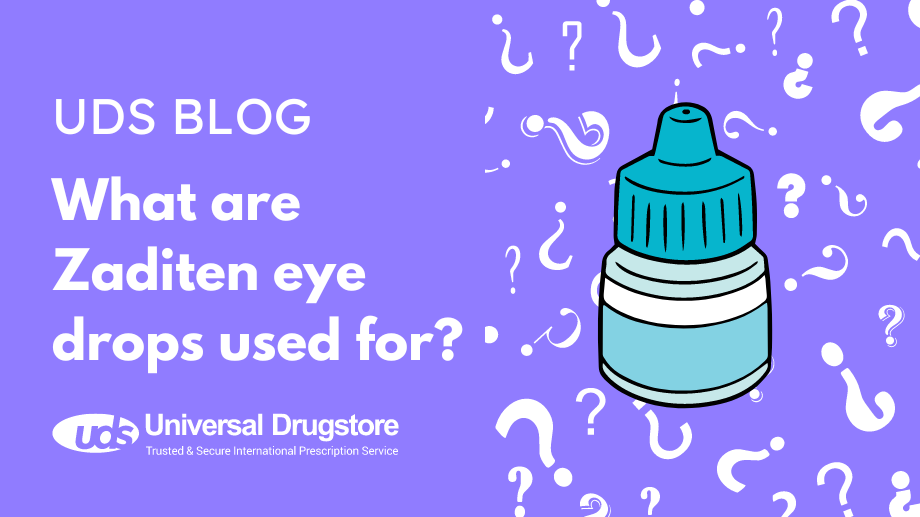What is Zaditen?

Zaditen (ketotifen) is a brand-name antihistamine that is manufactured by Novartis Pharmaceuticals. It is commonly used to relieve symptoms associated with allergic conditions, such as seasonal allergic conjunctivitis (itchy, watery eyes) and allergic rhinitis (runny or stuffy nose). Ketotifen works by blocking the release of histamine, a substance in the body that contributes to allergic symptoms.
In addition to its use for allergic conditions, Zaditen tablets are used in preventing asthma attacks and managing other inflammatory conditions. It is available in various forms, including eye drops, tablets, and syrup. As with any medication, it’s important to use Zaditen under the guidance and prescription of a healthcare professional and to follow the recommended dose and instructions.
Keep reading as we go into more detail about Zaditen and answer some frequently asked questions.
Zaditen FAQs
What is Zaditen used for?
Zaditen eye drops, whose active ingredient is ketotifen hydrogen fumarate, is an anti-allergic antihistamine used for the short-term treatment of seasonal allergic conjunctivitis (itchy, watery eyes) in adults and children 3 years of age or older. Zaditen tablets and syrup, which contain the same active ingredient, are used to treat allergy symptoms such as sneezing and runny nose as well as to prevent bronchial asthma. They should not be used to treat an asthma attack that is already occurring.
What are the side effects of Zaditen?
The most common side effects of Zaditen seen in clinical trials when compared to placebo include:
- Eye irritation (eye drops)
- Eye pain (eye drops)
- Somnolence (drowsiness)
Other possible side effects of Zaditen include:
- Dry mouth
- Headache
- Weight gain
- Blurred vision
- Dizziness
- Agitation
- Nervousness
- Insomnia
Rarely, Zaditen may cause serious side effects such as:
- Serious, life-threatening allergic reactions, including anaphylaxis.
Symptoms of anaphylaxis may include urticaria (raised red patches on your skin or hives), swelling of your face, lips, tongue, or throat, and shortness of breath. Seek immediate medical attention if you experience any symptoms of a serious allergic reaction.
- Increased risk of seizures.
Convulsions have been reported during Zaditen therapy. As Zaditen may lower the seizure threshold it is contraindicated in patients with a history of epilepsy.
- Damage to soft contact lenses
Zaditen eye drops should not be used to treat eye irritation caused by wearing contact lenses. It contains benzalkonium chloride as a preservative that can be absorbed by soft contact lenses. If you wear soft contact lenses, remove them before you use Zaditen eye drops. You should wait at least 10 minutes after you use the eye drops to wear your contacts again.
- Impairment when driving or using machines
During the first few days of treatment with Zaditen, your reactions may be impaired, and therefore should exercise care when driving a vehicle or operating machinery.
These are not all of the possible adverse events of Zaditen. You should always seek medical advice from a healthcare professional for any questions or concerns about your medical condition or treatment. You should also read all the patient information, including your Medication Guide that comes with Zaditen. You can report side effects to the FDA at 1-800-FDA-1088 or www.fda.gov/medwatch.
How does Zaditen work?
The active substance in Zaditen is ketotifen hydrogen fumarate, which is a histamine H1-receptor antagonist. Blocking this receptor helps to reduce asthma and allergy symptoms by reducing the body’s response to allergens (substances that cause allergic reactions).
Shop Medications
What should you tell your healthcare provider before taking Zaditen?
You should not take this medication if you have a hypersensitivity to ketotifen or any of the inactive ingredients in the formulation. Zaditen tablets contain 1 mg of ketotifen fumarate as well as inactive ingredients such as magnesium stearate, and lactose monohydrate. Zaditen eye drops contain 0.25 mg/mL of ketotifen hydrogen fumarate and inactive ingredients such as benzalkonium chloride, glycerol, and sodium hydroxide. Zaditen syrup contains 1 mg ketotifen (as hydrogen fumarate) per 5 mL and inactive ingredients such as strawberry flavoring agent, citric acid, and maltitol liquid. See the package insert for all the inactive ingredients of the Zaditen medicinal product you are prescribed.
You should be sure your healthcare provider is aware of all your medical conditions as they may be contraindications or you may need increased monitoring during treatment, including:
- Epilepsy or history of seizures.
- Diabetes.
- Fructose or lactose intolerance.
- Pregnant or plan on becoming pregnant.
- Breastfeeding or plan to breastfeed.
The safety of using Zaditen during pregnancy has not been established. Zaditen should not be given to pregnant women except if needed and the benefits outweigh the potential risks. While there is no human data available, this drug is likely excreted in human breast milk. Therefore, mothers receiving Zaditen tablets should not breastfeed. However, Zaditen eye drops can be used while breastfeeding.
Are there any drug interactions with Zaditen?
When Zaditen is taken with other prescription drugs, over-the-counter medications, vitamins, herbal products, and supplements, it may change how they work or increase the risk of side effects. There are no interactions listed for Zaditen eye drops. However, if you are prescribed Zaditen tablets or syrup, tell your healthcare provider about all your current medications, including:
- Oral antidiabetic medications
- Sedatives
- Antihistamines
- Alcohol
This list is not complete and many other drugs may interact with Zaditen.
What is the dosage for Zaditen?
Your dose of Zaditen will be determined by your healthcare provider based on the condition being treated and which product you are using. Zaditen is available in an eye drop, tablet, or syrup.
The typical dose of Zaditen is as follows:
- Eye drop – The usual dose for patients 3 years of age and older is 1 drop in the affected eye(s) twice daily.
- Tablets – The usual dose is one Zaditen SRO tablet (2 mg) in the evening, or one Zaditen tablet (1 mg) twice daily (with morning and evening meals). If needed, the dose can be increased to two Zaditen SRO tablets once a day in the evening, or two Zaditen tablets twice daily.
- Syrup – For patients 6 months to 3 years of age, the usual dose is 0.25 mL syrup per kilogram body weight twice daily (morning and evening). For children over 3 years of age and adolescents, the usual dose is 5 mL twice daily with morning and evening meals.
What if you miss a dose of Zaditen?
If you or your child misses a dose of Zaditen, give it as soon as possible and continue with the regular dosing schedule. If it is almost time for the next dose, skip the missed dose and continue with your regular dosing schedule. Do not take a double dose to make up for any missed doses. If you are not sure what to do after missing a dose, contact your healthcare provider for advice.
How should you store Zaditen?
Store Zaditen as follows:
- Zaditen tablets: Do not store above 86°F (30°C).
- Zaditen SRO tablets: Store below 77°F (25°C).
- Zaditen syrup: Store below 86°F (30°C).
- Zaditen eye drops: See folding box.
Do not use any of these products after the expiry date and as with all medications, keep Zaditen out of the reach of children.
How long does it take Zaditen to work?
Zaditen eye drops, which are used to treat seasonal allergic conjunctivitis (itchy, watery eyes), can provide effective relief within the first hour after use and provide up to 12 hours of relief. Zaditen tablets and syrup are typically used to treat and prevent certain allergy symptoms. It is also used to control asthma and prevent attacks. It typically requires a few weeks to see its full effect.
Related Medications
- Zaditor Eye Drops (ketotifen)
- Pataday Eye Drops (olopatadine)
- Patanol Eye Drops (olopatadine)
- Lastacaft Eye Drops (alcaftadine)




